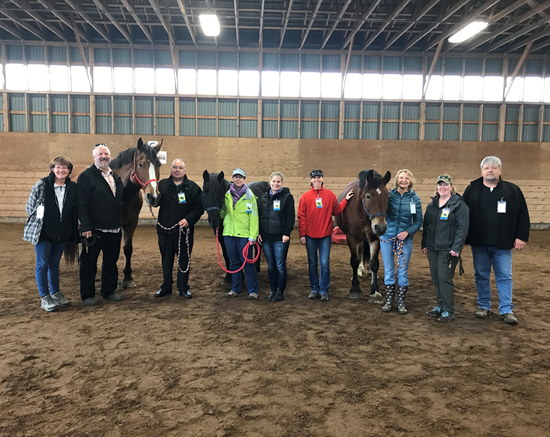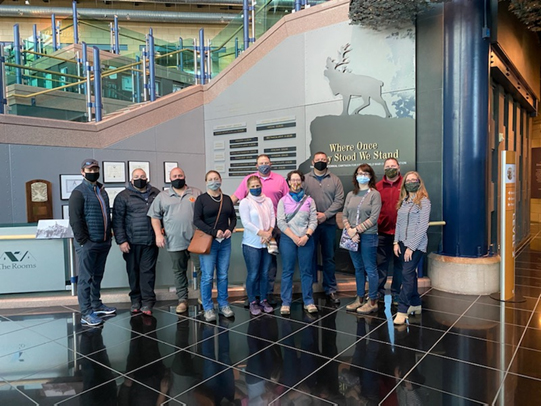Redefining Resiliency within the Workplace
February 4, 2021 - Defence Stories

Caption
CAF TC Greenwood organized a morning at the Rohan Wood Stables in Aylesford, Nova Scotia to learn more about Equine Assisted Psychotherapies. (Photo taken October 7 in an open barn when NS had no cases of COVID-19 and was part of the Atlantic bubble.
Photo credit: Kathleen Murphy, Rohan Wood Stables)
In 2019, Canadian Armed Forces Transition Unit Nova Scotia and Newfoundland (CAF TU NS/NL) set goals to redefine resiliency within the workplace. Canadian Armed Forces (CAF) Transition Centres (TCs) fall under the Canadian Armed Forces Transition Group (CAF TG) and are run by military members and Department of National Defence employees who work face-to-face with the ill and injured. They can experience compassion fatigue and burnout in the course of their work.
Motivated by the Road to Mental Readiness program, the tragedies that took place in Nova Scotia in 2020, and her own past experiences, Capt Wendy Hopkins redesigned the concept of resiliency within the workplace by focusing on both mental and physical health. Capt Hopkins is the Operations Officer for CAF TU NS/NL and is continuously looking for new and innovative ways to cultivate change and motivate team members.
Capt Hopkins took all the TCs within the CAF TU NS/NL on a self-care journey. She introduced different therapies during professional development days, and twice challenged the CAF Transition Unit British Columbia (CAF TU BC) to “walk across Canada.” This took the form of a friendly and healthy competition between CAF TU NS/NL and CAF TU BC to see which team could log the most kilometres of activity in a month and symbolically travel the farthest across Canada. It was the great East vs. West showdown … and it was a draw (the East won the challenge in the first year, with the West becoming the reigning champions in year two). She also produced a monthly newsletter that presented different forms of resiliency and therapies.
An example of one such therapy is Equine Assisted Psychotherapy (EAP). EAP is an alternative approach to talk therapy in which horses are used to offer a sense of security and comfort. Participants learn new skills on how to connect and guide since horses can be very stubborn and cannot verbally communicate what motivates them. The EAP experience is very positive and something the TCs can now share with their teams and the members they support.

Caption
CAF TC St. John’s organized a morning to explore The Rooms, a cultural facility in St. John's, Newfoundland and Labrador.
(Photo credit: Maureen Peters, Curator of History for The Rooms)
Capt Hopkins introduced TC St. John’s, which is located within an Army garrison, to the Tension and Trauma Release Exercise (TRE). TRE is a simple yet innovative series of exercises that assist the body in releasing deep muscular patterns of stress, tension and trauma. It is suitable for treating stress and tension, chronic pain, and post-traumatic stress disorder, among other ailments. TRE is used by the military, police forces, fire departments, nurses, doctors, and paramedics all over the world. The response from those who have participated has been one of relief and comfort. Participants in the exercise who suffer from chronic pain noted that their pain and stress had decreased due to the exercise. When a person feels less pain and tension they are more effective and can share this experience with others who suffer from similar issues.
TC Halifax was afforded the opportunity to receive presentations from a variety of speakers who have centred their careers on resiliency and personal wellness. Natalie Randall-Price, an Osteopath and Athletic Therapist, took participants on a journey that provided insight into the importance of physiology, highlighted by her own personal experiences. She explained how the body reacts to trauma and how we can support our personal healing through proper sleep, nutrition, exercise and mindfulness. Darren Steeves, who works with high-performance athletes, presented an alternative point of view with regards to resiliency. Amanda Hobart, a certified yoga practitioner, led the TC through a series of therapeutic yoga exercises focused on balance and mindfulness that can be essential tools for self-care.
Everyone agrees that 2020 was a difficult year. The biggest takeaway is that there is more than one way to find resiliency within yourself. And we need it now more than ever.
Links
Equine Assisted Psychotherapy: http://rohanwoodstables.com
Trauma Release Exercises: https://trecanada.ca, http://www.potentiality.ca
Natalie Randall-Price can be reached through: https://covesporttherapy.ca
Darren Steeves can be reached through: http://www.vendurawellness.com